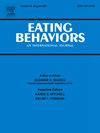负面情绪分化,而不是胃内感受,与进食病理升高的女性“感觉肥胖”有关
IF 2.4
3区 医学
Q2 PSYCHIATRY
引用次数: 0
摘要
“感觉胖”是超重的主观感觉,不能完全用体重来解释。情绪分化和胃内感受的中断可能导致感觉肥胖。我们假设,在调整负面情绪强度和体脂率后,不良的负面情绪分化和不良的胃内感受准确性都与较高的感觉肥胖水平有关。顺性别女大学生(N = 69;M(SD)年龄= 20.3(3.7),异性恋60.9%,白人91.3%)完成问卷调查和两步水负荷测试。对负面情绪强度和体脂率进行调整的回归分析发现,负面情绪分化(B <;0.001, p = 0.52)与胃内感受准确度(B = 0.01, p = 0.97)无关。事后,进食病理严重程度调节了负性情绪分化与感觉肥胖的关系(B = - 6.97, p = .03);对于饮食失调检查问卷整体得分高于1.47的患者,较差的负面情绪分化与更大的肥胖感相关(B = - 5.79, p = 0.050)。胃内感受与感觉肥胖之间的关系不因进食病理严重程度而变化(B = - 0.04, p = .79)。自我报告的饱腹感也有助于在喝水到最大饱腹感后感到肥胖(p <;措施);然而,在整个任务中,饱腹感的变化与感觉肥胖的变化无关(p = .09)。对于那些饮食病理升高的人来说,较差的负面情绪分化与感觉肥胖有关。饮食病理升高的个体可能会受益于提高他们标记和理解情绪的能力,以减少感觉肥胖。未来的研究应该测试饱腹感的变化是否会导致肥胖。本文章由计算机程序翻译,如有差异,请以英文原文为准。
Negative emotion differentiation, but not gastric interoception, is linked to “feeling fat” among women with elevated eating pathology
“Feeling fat” is the subjective sensation of being overweight, which is not fully explained by one's body weight. Disruptions in emotion differentiation and gastric interoception may contribute to feeling fat. We hypothesized that poor negative emotion differentiation and poor gastric interoceptive accuracy would each be associated with higher levels of feeling fat after adjusting for negative affect intensity and body fat percentage. Cisgender female university students (N = 69; M(SD) age = 20.3(3.7), 60.9 % heterosexual, 91.3 % white) completed questionnaires and the two-step water load test. Regression analyses, which adjusted for negative affect intensity and body fat percentage, found that neither negative emotion differentiation (B < 0.001, p = .52) nor gastric interoceptive accuracy (B = 0.01, p = .97) were related to feeling fat. Post hoc, eating pathology severity moderated the relationship between negative emotion differentiation and feeling fat (B = −6.97, p = .03); poorer negative emotion differentiation was associated with greater feeling fat for those with Eating Disorder Examination Questionnaire Global Scores above 1.47 (B = −5.79, p = .050). The relationship between gastric interoception and feeling fat did not vary by eating pathology severity (B = −0.04, p = .79). Self-reported feeling full also contributed to feeling fat after consuming water to perceived maximum fullness (p < .001); however, changes in feeling full were not associated with changes in feeling fat across the task (p = .09). Poorer negative emotion differentiation is associated with feeling fat for those with elevated eating pathology. Individuals with elevated eating pathology may benefit from improving their ability to label and understand emotions to reduce feeling fat. Future research should test whether changes in feeling full cause feeling fat.
求助全文
通过发布文献求助,成功后即可免费获取论文全文。
去求助
来源期刊

Eating behaviors
Multiple-
CiteScore
4.20
自引率
3.60%
发文量
65
审稿时长
60 days
期刊介绍:
Eating Behaviors is an international peer-reviewed scientific journal publishing human research on the etiology, prevention, and treatment of obesity, binge eating, and eating disorders in adults and children. Studies related to the promotion of healthy eating patterns to treat or prevent medical conditions (e.g., hypertension, diabetes mellitus, cancer) are also acceptable. Two types of manuscripts are encouraged: (1) Descriptive studies establishing functional relationships between eating behaviors and social, cognitive, environmental, attitudinal, emotional or biochemical factors; (2) Clinical outcome research evaluating the efficacy of prevention or treatment protocols.
 求助内容:
求助内容: 应助结果提醒方式:
应助结果提醒方式:


